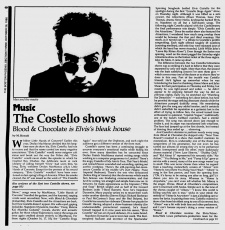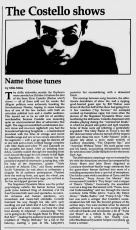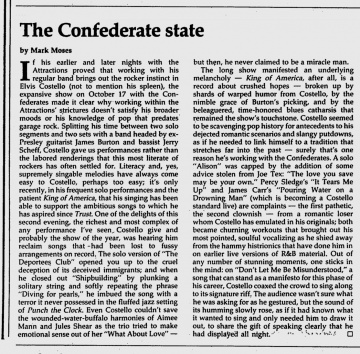Boston Phoenix, October 28, 1986: Difference between revisions
(Undo revision 17256761) |
(+text part 1) |
||
| Line 4: | Line 4: | ||
{{:Magazine index}} | {{:Magazine index}} | ||
{{Bibliography article header}} | {{Bibliography article header}} | ||
<center><h3> | <center>''' The Costello shows </center> | ||
<center><h3> ''Blood & Chocolate'' is Elvis's bleak house </h3></center> | |||
<center>''' </center> | <center>''' </center> | ||
---- | ---- | ||
| Line 10: | Line 11: | ||
---- | ---- | ||
{{Bibliography text}} | {{Bibliography text}} | ||
Whither Little Hands of Concrete? Earlier this year, Declan MacManus decided that his longtime nom de show biz, Elvis Costello, had run its course and that the name carried too many negative associations: "Elvis Costello" would never outgrow cult status and break out the way the Police did; "Elvis Costello" would never shake the episode in which he insulted Ray Charles; the deliberate taunt at rock idolatry of calling himself "Elvis" had worn thin. So long, Elvis; welcome Declan MacManus a/k/a Little Hands of Concrete. Except for the protests of his record company, "Elvis Costello" wouldn't have been mentioned on last spring's ''King of America''. When the smoke cleared, the LP was issued as the work of "The Costello Show," songs were by MacManus, "Little Hands of Concrete" handled the guitars, and the haunted, rasping vocals went uncredited. Now, with ''Blood & Chocolate'' (Columbia), Elvis Costello and the Attractions are back, but Elvis Costello doesn't appear. His wide-eyed, gaping lookalike, Napoleon Dynamite, handles "Vocaj, Elektra Kaj Akustika Guitaroj" (vocals, electric and acoustic guitar, for those whose Esperanto is rusty); the songs are once again credited almost entirely to MacManus. For three nights (October [[Concert 1986-10-16 Boston|16]], [[Concert 1986-10-17 Boston|17]], [[Concert 1986-10-18 Boston|18]]), the "[[:Category:Costello Sings Again Tour|Costello Sings Again]]" tour sold out the Orpheum, and each night the audience got a different version of the front man. | |||
Costello's career has been a continuing struggle to uncover everyone's emotional truths while hiding his own. How many identities has he concocted since Declan Patrick MacManus started writing songs while working as a computer programmer in London? There's the angry Costello of ''My Aim Is True'', ''This Year's Model'', and ''Armed Forces'': wounded and wounding, spitting out acerbic wordplay. There's the still-punning-but-more-secure Costello of his middle LPs (''Get Happy'', ''Trust'', ''Imperial Bedroom''). There's the one who announced (before ''King of America'') that the cleverness which made him famous was hindering communication, and that he'd be writing 'em straight and simple from now on. In between, he made appearances as the Imposter ("Pills and Soap" British single) and as half of the Coward Brothers (with T-Bone Burnett). Now he's Napoleon Dynamite. Many popular artists try to recast their work under another identity (Steven King's Richard Bachman or Paul McCartney's Suzy and the Red Stripes), but Costello has created an elaborate Chinese-box puzzle for himself. Having adopted a show-business identity (for understandable promotional reasons), he's found himself trapped in it; nine years into his career, "Elvis Costello" isn't an act of punk defiance, it's a name brand. | |||
Napoleon Dynamite ''was'' in town last week. The foul-tempered huckster and inventor of the Spectacular Spinning Songbook battled Elvis Costello for the spotlight during the first "Costello Sings Again" show, on Thursday night. Although it was billed as a solo concert, the Attractions (Bruce Thomas, bass; Pete Thomas, drums; Steve Neive, keyboards) backed Elvis, er, Napoleon on all but a half-dozen songs. The following night Costello played with the Confederates; the final performance was simply "Elvis Costello and the Attractions." Since the earlier show also featured the Attractions, I wondered how much song overlap there would be between the first And third evenings. Not much, as it turned out — a tribute to Costello's prolific songwriting. Each night offered roughly 25 numbers (counting medleys), and only four were repeated (one of which the band has never recorded, Little Willie John's "Leave My Kitten Alone"). Even though the Series was opening, word on the street pegged the Saturday-night Attractions show as the hottest ticket of the three nights. Like the Mets, it came up short. | |||
The difference between the two Costello/Attractions shows was so striking it's hard to believe that they were separated by only one night. More than that, the second was the least satisfying concert I've seen them give — which covers every one of the dozen or so shows they've done in this area. Part of the trouble was Costello himself. He'd lighten up somewhat when he was introducing the band or thanking Aimee Mann and Jules Shear for their participation on Thursday and Friday, but mostly he was tight-jawed and sullen — he didn't appear to he enjoying himself the way he did on previous nights. Early on, he stretched out "Watching the Detectives" — something he's done before, but here he prowled the stage striking dissonant chords while the Attractions pumped dutifully away. His meandering didn't give the song any added tension, and it certainly didn't embellish his reputation as a guitarist; lost in the effort of trying to follow him, the crowd turned from enthusiastic to quizzical. "Lipstick Vogue," traditionally one of the band's hellbent numbers, had a similar problem. The song was slowed down just enough to vitiate it, and its anger was transformed into weariness. The fans had jumped up at the first chords, but instead of dancing they ended up ... observing. | |||
And Costello's decision to perform nearly every song from ''Blood & Chocolate'' (he skipped only "Next Time Round") resulted in a show that couldn't maintain its momentum. Elvis is undeniably one of the finest pop songwriters of his generation, but not even he has turned out albums so strong they cry to be performed whole. Interspersed amid his other, more judiciously chosen material ("New Lace Sleeves," "Shabby Doll," and "Kid About It" represented his romantic side; "No Action," "You Belong to Me," and "Pump It Up" gave us service with a sneer), many of the new songs weren't up to snuff. This was never clearer than when he segued from a touching, melancholy version of "Alison" into "Home Is Anywhere You Hang Your Head." "Alison" is sung in the first person, and from the opening lines (''"Oh, it's funny to be seeing you after so long, girl"'') it draws you into its story. Whereas in "Home Is Anywhere," you can't even tell whether Mr. Misery is the singer. Worse, ''Blood & Chocolate'''s compositions aren't concerned with hooks. Simple as it is, the tune of the chorus couplet of "Alison," ''"I know this world is killing you / My aim is true,"'' sticks in your mind; the melody of "Home Is Anywhere" is just a plodding cart to carry the lyrics. In pairing these two, Costello wanted to draw a line from his oldest song to one of his newest; but "Alison" was a hit with both fans and other performers, and I can't foresee anyone's doing a cover version of "Home." | |||
''Blood & Chocolate'' reunites the Elvis/Attractions/ Nick Lowe performers-production team for the first time in six years. It is not, however, a return to the social grappling and wide-ranging musical attack of ''Armed Forces'' or ''Trust'' but rather a continuation of the stark theme that Costello has pursued since ''Imperial Bedroom'': bitter tears before bedtime. Those who thought that his new happiness with the Pogues' Cait O'Riordan — captured in "Lovable," their cowritten composition on ''King of America'' — meant that Costello would turn his back on turmoil had better think again. ''Blood & Chocolate'' is strewn with the desperate, the self-pitying, and the emotionally lame, with old maids, battered old birds, and psychotic jilted suitors. It's the bleakest, angriest record about relationships he's ever crafted. | |||
The cornerstone of this LP is "I Want You," a harrowing six-and-a-half-minute journey through obsession. Costello's narrator is so fixated on this woman that even as he recounts her infidelities and his humiliations, he cannot help returning to "I want you." ''"I want you so it scares me to death,"'' he sings, knowing, as all great horror directors do, that the heart of terror is in the stillness before violence erupts. The final chill of "I Want You" is his failure to break out, to get any release. ''"I know I'm going to feel this way until you kill it,"'' he concludes, sending a shudder through you. As with most of the LP, this song is stripped down to an extremely bare arrangement. Although the Attractions provide their usual tensile back-up work (particularly drummer Pete Thomas), they seem grafted onto the album, an after-the-fact bit of fleshing out of a solo acoustic work. | |||
The exception is the single, "Tokyo Storm Warning," which he wrote with O'Riordan. Taking off from the "doo-doo" organ chords and headlong storytelling style of Dylan's "From a Buick 6," the song is a cyclone of crazed images: monster movies, dead Italian tourists, Japanese God-Jesus robots, Argentinian waitresses. Costello's whirlwind whisks us from Korea to South America to Japan to France, with a few other stops along the way. Strafing the idea that things are better elsewhere, our guide gets the locals in his sights, and ''"for all we know and all we care, they might as well be Martians."'' Costello may have used Esperanto, the failed international language, on his liner notes, but his true idea of "one world" is that everyone's trapped in the same demented funhouse. More than any other of his songs, this is Elvis's nod to rock-and-roll Dylan: songwriting that sweeps us up and along in the offhand fun, with a motherlode of flashy references for the college English majors who want to grow up to be rock critics. | |||
{{cx}} | {{cx}} | ||
| Line 18: | Line 33: | ||
{{Bibliography notes}} | {{Bibliography notes}} | ||
'''Boston Phoenix, October 28, 1986 | '''Boston Phoenix, October 28, 1986 | ||
---- | |||
[[M. Howell]] reviews ''[[Blood & Chocolate]]'' and reports on the third Boston show, Saturday, [[Concert 1986-10-18 Boston|October 18]]. | |||
---- | ---- | ||
[[Milo Miles]] reviews Elvis Costello & [[The Attractions]], Thursday, [[Concert 1986-10-16 Boston|October 16, 1986]], Orpheum Theatre, Boston, MA. | [[Milo Miles]] reviews Elvis Costello & [[The Attractions]], Thursday, [[Concert 1986-10-16 Boston|October 16, 1986]], Orpheum Theatre, Boston, MA. | ||
---- | ---- | ||
[[Mark Moses]] reviews EC with [[The Confederates]], Friday, [[Concert 1986-10-17 Boston|October 17]]. | [[Mark Moses]] reviews EC with [[The Confederates]], Friday, [[Concert 1986-10-17 Boston|October 17]]. | ||
{{Bibliography images}} | {{Bibliography images}} | ||
[[image:1986-10-28 Boston Phoenix page 08 clipping.jpg| | [[image:1986-10-28 Boston Phoenix page 08 clipping.jpg|x230px|border]] | ||
<br><small> | [[image:1986-10-28 Boston Phoenix page 10 clipping 1.jpg|x230px|border]] | ||
<br><small>Clippings.</small> | |||
{{Bibliography box 360}} | |||
<center><h3> Name those tunes </h3></center> | |||
---- | |||
<center> Milo Miles </center> | |||
---- | |||
{{Bibliography text}} | |||
<br><br><br><br><br><br><br> | |||
<br><br><br><br><br><br><br> | |||
{{cx}} | |||
{{cx}} | |||
<br><br> | |||
[[image:1986-10-28 Boston Phoenix page 10 clipping 2.jpg|360px|border]] | [[image:1986-10-28 Boston Phoenix page 10 clipping 2.jpg|360px|border]] | ||
<br><small>Clipping.</small> | <br><small>Clipping.</small> | ||
{{Bibliography box 360}} | |||
<center><h3> The Confederate state</h3></center> | |||
---- | |||
<center> Mark Moses </center> | |||
---- | |||
{{Bibliography text}} | |||
<br><br><br><br><br><br><br> | |||
<br><br><br><br><br><br><br> | |||
{{cx}} | |||
{{cx}} | |||
<br><br> | |||
[[image:1986-10-28 Boston Phoenix page 08.jpg|x120px|border]] | [[image:1986-10-28 Boston Phoenix page 08.jpg|x120px|border]] | ||
[[image:1986-10-28 Boston Phoenix page 10.jpg|x120px|border]] | [[image:1986-10-28 Boston Phoenix page 10.jpg|x120px|border]] | ||
| Line 55: | Line 98: | ||
[[Category:Boston Phoenix| Boston Phoenix 1986-10-28]] | [[Category:Boston Phoenix| Boston Phoenix 1986-10-28]] | ||
[[Category:Magazine articles]] | [[Category:Magazine articles]] | ||
[[Category:Album reviews]] | |||
[[Category:Blood & Chocolate reviews]] | |||
[[Category:1986 concert reviews]] | [[Category:1986 concert reviews]] | ||
[[Category:Costello Sings Again Tour|~Boston Phoenix 1986-10-28]] | [[Category:Costello Sings Again Tour|~Boston Phoenix 1986-10-28]] | ||
Revision as of 18:21, 14 February 2014
|




